Posts Tagged ‘Science Fiction Movies’
November 10, 2014
Thank goodness for television’s “Buffy the Vampire Slayer” and the “Twilight Zone,” and their plots revolving around portals and dimensions, or else many of us would have no idea of what is going on in much, particularly the last quarter, of “Interstellar.” Who knew TV could be so educational? In all seriousness, “Interstellar” is not all that easy to understand or hear, for that matter. More about that later. Directed by Christopher Nolan and written by Christopher and his brother, Jonathan Nolan, “Interstellar” is beautiful to look at and boasts a very strong cast. However, when the film is over, it seems as if the overly complicated plots (and yes, plots) could be boiled down to the Beatles’ song, “All You Need is Love.”
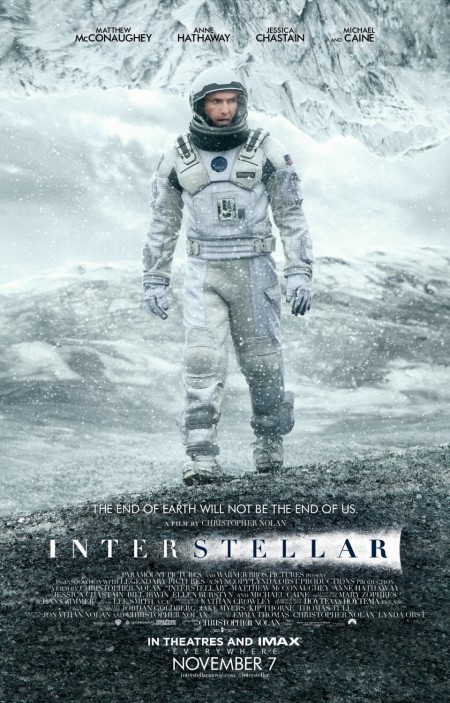
“Interstellar” opens with an elderly woman (Ellen Burstyn) talking about her father and the days when she was a young girl. Then we go back in time to those days set in the not too distant future. Thanks to drought, blight and dust storms, food is in very short supply and there is good reason to believe that the planet will not be able to sustain itself much longer.
Former NASA test pilot turned farmer, Cooper (Matthew McConaughey), is a widower who lives with his children, 10-year-old Murphy (Mackenzie Foy) and 15-year-old Tom (Timothée Chalamet), and his father-in-law, Donald (John Lithgow). Murphy is much more like the scientist part of her father and they have a very close connection. One night the two accidentally discover the secret NASA headquarters where a Professor Brand (Michael Caine) and others, chief among them, his daughter, Amelia (Anne Hathaway), are trying to find another planet on which humans will be able to live. Brand, who is Cooper’s former professor, decides to take advantage of Cooper’s special skills. To go further would give away too much of the plot. Suffice to say that a good portion of the remaining film takes place in space.
Matthew McConaughey is outstanding as the farmer/pilot. It’s unfortunate that his Lincoln car commercials premiered before this film because some of his dialogue and delivery sound like they come directly from those commercials. However, much of “Interstellar” falls on McConaughey’s shoulders and he carries the weight well in spite of that distraction. He’s very convincing in all the many facets of his character’s personality. Jessica Chastain is very good as the adult Murphy. She has very emotional scenes, some of them absent any dialogue, and she shines in all of them. But Chastain is no match for the actress who plays her as a young girl. Mackenzie Foy is simply terrific and her scenes with McConaughey are really at the film’s core and they are amazing together. The one minus is that Foy bears no resemblance to Chastain, in fact looking much more like Anne Hathaway. Hathaway turns in a fine performance as McConaughey’s traveling companion, although her role calls for her to be a tad too emotional at times. Michael Caine’s role is small, but his scenes near the film’s conclusion are great. The film features what’s been called a cameo appearance by an actor who is critical to “Interstellar’s” plot (if you’re a reader of the tabloids, this actor is won’t be much of a surprise). He provides a good performance even though it’s not always clear what his character is doing or why.
Hans Zimmer’s score is extremely good, but its use is horrific. The music is simply too loud which makes portions of the dialogue impossible to hear. The same can be said for much of the film’s special sound effects. Louder does not mean better, especially if it’s blotting out what could be important conversations. Much of what is being said is hard enough to understand without the added burden of not being able to hear.
It’s clear that Nolan was going after something big. Unfortunately, despite the spectacular visual effects and some good acting, the unnecessarily overly complicated, hard-to-hear “Interstellar” falls short.
2 ½ nuggets out of 4
Tags:Anne Hathaway, Christopher Nolan, DC movie reviews, DC movies, Interstellar, Jessica Chastain, Matt Damon, Matthew McConaughey, Michael Caine, Movie Reviews, Science Fiction Movies
Posted in Arts, Movie Reviews | Leave a Comment »
July 27, 2014
In one year’s time, Scarlett Johansson has been a disembodied voice in “Her,” an alien with little voice in “Under the Skin,” and now, in “Lucy,” an infected human with an almost robotic voice.
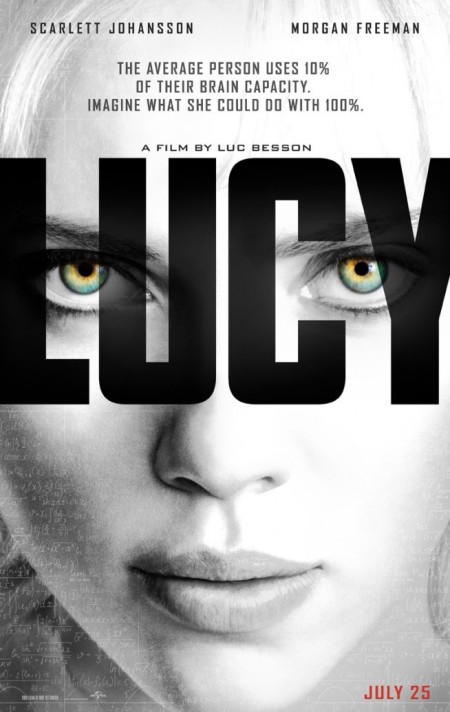
Written and directed by Luc Besson, “Lucy” poses the question of what would happen if humans were able to access 100 percent of their brain’s capacity. As we learn from a lecture given by the film’s Professor Norman (Morgan Freeman) on this topic, dolphins access more of their brain’s capacity than do humans. As he is giving his lecture, we meet, at the same time, Lucy, a young grad student in Taipei. In Taipei she’s been partying hard and taken up with a so not worthy guy, Richard (Pilou Asbæk). Perhaps starting to see the error of her ways in the light of day, she attempts to break things off outside a luxury hotel. Richard brushes off her comments and asks her to make a “delivery” of a briefcase to a man inside the hotel for him. When she turns him down, he handcuffs her to the case and tells her that only the recipient of the briefcase has the key to the handcuffs. Forced to make the delivery, she discovers that the man, Mr. Jang (Min-sik Choi), is part of some sadistic drug ring. The drug in question, she later finds out, is a synthetic drug called CPH4 which can increase the user’s brain function capacity. Without giving too much away, this drug eventually leads her to Paris and Professor Norman.
“Lucy” has a lot going on—some of it very excellent, some not so much. What is very good is the first 40 minutes or so. That part of “Lucy” is tense, gory, gross and exhilarating. Johansson is absolutely terrific in those scenes. But too much of “Lucy” has a plethora of animal symbolism, allegories of all kind and a lot of scientific mumbo jumbo…mumbo jumbo of which Morgan Freeman is almost able to make comprehensible…almost.
Morgan Freeman is a hugely talented actor. But as “Lucy’s” voice of reason, his role is very similar to the one he just portrayed in “Transcendence.” One hopes that someday soon he gets a part into which he can truly sink his teeth. Unfortunately, Professor Norman is not that role. Scarlett Johansson gives a master class in showcasing fear and horror in “Lucy’s” early scenes. It’s actually a physical tour de’ force. But as the film progresses, through no fault of her own, she becomes more robotic, and that’s just not entertaining
Attention must be paid to and discussed about “Lucy’s” antagonists. Lately there seems to be an overabundance in films and in television shows of Asians portrayed as unfeeling, heartless, soulless killers. I don’t want to be too politically correct here, but these portrayals seem like a disturbing trend. There’s good and bad in all races and nationalities. Wouldn’t it be more challenging for a writer to mix the villains up a bit?
It would appear that Luc Besson was aiming for something larger than what was ultimately delivered, which is too bad. He had the acting talent to make that happen.
2 ½ nuggets out of 4
Tags:DC movie reviews, DC movies, Her, Luc Besson, Lucy, Min-sik Choi, Morgan Freeman, Movie Reviews, Scarlett Johansson, Science Fiction Movies, Transcendence, Under the Skin
Posted in Arts, Movie Reviews | Leave a Comment »
July 22, 2014
“Dawn of the Planet of the Apes” may be the most entertainingly interesting of the entire “Ape” series. Directed by Matt Reeves with screenplay by Mark Bomback, Rick Jaffa and Amanda Silver, “Dawn of the Planet of the Apes” delves into the good and evil in all species.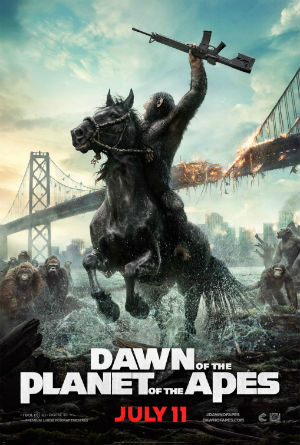
The film, through its human and ape leads, dramatically demonstrates that no one race or being is monolithic in thinking or behavior. On paper, this might not seem terribly interesting, but when portrayed on the screen, it most definitely is. What is curious is that “Dawn of the Planet of the Apes” also has a very subtle anti-gun feel to it, which is ironic, since the first film’s lead, Charlton Heston, was such a strong gun supporter.
“Dawn of the Planet of the Apes” very cleverly opens with real world news occurrences leading to the events in 2018, when a virus has killed much of mankind. Eight years later a group of human survivors, immune to the virus, are living under the leadership of Dreyfus (Gary Oldman) in San Francisco. These remaining humans dwell in chaos and economic depression. The humans and apes co-exist in fragile peace, in very separate communities until a human, Carver (Kirk Acevedo), wanders off into ape territory and runs into two apes. Spooked, he reacts in typical American fashion—pulling out a gun—and shooting at the two, one of which is the son of Caesar (Andy Serkis), leader of the ape community. With that gunshot, peace is destroyed. Amidst these hostilities, the San Francisco community is close to running out of power. Malcolm (Jason Clarke), an engineer of sorts, convinces leader Dreyfus to give him three days to make peace with the apes in order to gain access to a hydroelectric dam in their territory, which could provide power to the city. Malcolm and Caesar meet and come to realize that they have similar values and, hence, a bond is formed and peace is made…for a period of time. However, each has other “colleagues” who don’t share their values—Koba (Toby Kebbell)—a thorn in Caesar’s side—and both Carver and Dreyfus have views contrary to Malcolm’s. Can the humans and apes get along for good or will there always be suspicions and the threat of war?
“Dawn of the Planet of the Ape’s” acting seems to vary depending upon the species and the writing. For the apes, much of the acting is conveyed through the eyes and in their motions. As Caesar, Andy Serkis handles this perfectly. He really makes you believe in the ape’s humanity. At the same time, Toby Kebbell‘s Koba is very good in portraying Caesar’s exact opposite. The sub-par writing for the humans put the actors at a distinct disadvantage. Gary Oldman’s and Kirk Acevedo’s characters’ dialogue seems almost cartoonish and they struggle to rise above the script. Jason Clarke, Keri Russell as Ellie, and Kodi Smit-McPhee as Malcolm’s son, Alexander, have much better material from which to work and are very convincing as the do-gooder humans.
“Dawn of the Apes” make-up and special effects for the apes continue to astound. The apes seem so real that they make the scenery seem fake.
“Dawn of the Apes is not a joyous or hopeful film, but it is an unexpectedly intelligent one and in its own way is very entertaining.
3 nuggets out of 4
Tags:Andy Serkis, Charlton Heston, Dawn of the Planet of the Apes, DC movie reviews, Gary Oldman, Jason Clarke, Kerri Russell, Matt Reeves, Movie Reviews, Planet of the Apes, Science Fiction Movies
Posted in Arts, Movie Reviews | Leave a Comment »
June 8, 2014
Leave it to Tom Cruise and director Doug Liman to show with “Edge of Tomorrow” just how one does a big action picture right. Directed by Liman, with screenplay by Christopher McQuarrie, Jez Butterworth and John-Henry Butterworth, based on Hiroshi Sakurazaka ‘s novel, All You Need Is Kill, “Edge of Tomorrow” takes place in the future when the world’s countries are united (United Defense Forces (UDF) ) against a common enemy—an alien form of life called Mimics. Just how the world wins the battle…or will it…is the film’s basic plot.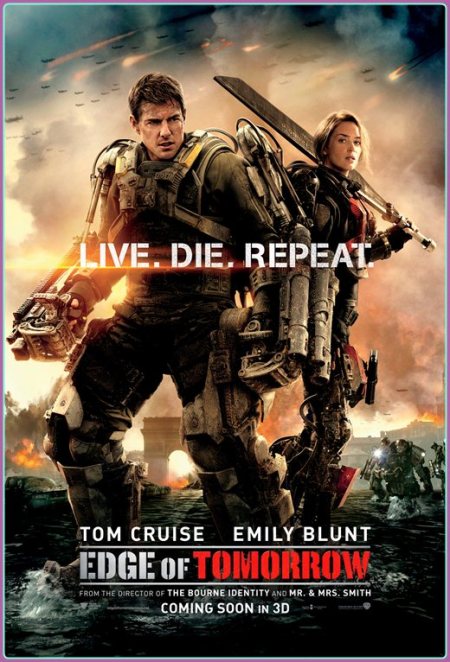
The film opens with CNN footage of the ongoing battles and then goes to an interview with Major William Cage (Tom Cruise), a UDF spokesman and officer in the United States Army Reserve, on CNN’s Jake Tapper’s “The Lead.” After the interview, Cage heads to London to meet with General Brigham, (Brendan Gleeson), commander of the UDF, who informs him that he has the “opportunity to be embedded with the armed forces as they prepare to fight in France. Gates, who’s never actually been in combat, balks at the assignment and threatens the General. But the General one-ups him, telling Gates he has no choice, strips Gates of his rank, and sends him out, in handcuffs no less, under the watch of Master Sergeant Farell (Bill Paxton) and his band of ragtag soldiers. To say Gates is out of his depth is putting it mildly, but the soldiers deploy and a bloody fight incurs. It’s during this battle that Gates experiences the first of his many time resets, “Groundhog Days,” if you will. It’s in one of his earlier resets that he meets up with war hero Rita Vrataski, the “Angel of Verdun” (Emily Blunt). He discovers that she had also experienced resets, just like Gates. They form an alliance and together the two try to come up with a plan full of action, fights and resets to save the world.
“Edge of Tomorrow” has its share of astounding special effects and weird, spider-like villains, but unlike other special effects-laden war/end of the world movies out this year with more to come, this film also has brains and wit. It just seems more intelligent and it’s never boring. What’s even stranger, but in a good way, is that even though scenes are repeated, the movie never feels repetitive.
Although “Edge of Tomorrow” is billed as a Tom Cruise movie, Emily Blunt has almost the same amount of screen time as Cruise and she is every bit his equal. Not one you’d normally associate with an action flick, Blunt is amazing. Her chemistry with Cruise is terrific and this lady can kick some mean butt. As one would expect, Cruise excels in the scenes which cause for him to be cocky and he’s great in all of the action sequences. But he’s also very good in the scenes in which he’s literally freaking out or when he’s dazed and somewhat confused. Giving heft to the all-around good acting are Gleeson and Paxton in their supporting roles.
Just when I was about to give up on ever watching a really good, substantive special effects, end-of-the-world film, along comes “Edge of Tomorrow.” Tom Cruise and Emily Blunt really do save the day.
3 ½ nuggets out of 4
Tags:Action movies, Bill Paxton, Brendan Gleeson, DC movie reviews, DC movies, Doug Liman, Edge of Tomorrow, Emily Blunt, Movie Reviews, movies, Science Fiction Movies, Tom Cruise
Posted in Arts, Movie Reviews | Leave a Comment »
May 22, 2014
Sometimes there are no words to describe how bad something is. That isn’t the case with “Godzilla.” Disappointing…boring…repetitive…dumb…those are just a few words that come to mind. How did this film screw things up so horribly?
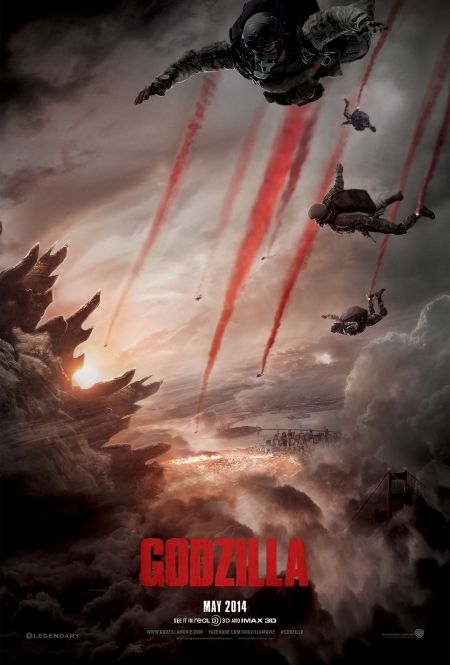
Directed by Gareth Edwards, with screenplay by Max Borenstein and story by Dave Callaham, “Godzilla” is a new take on earlier 1950s versions. In their own way, the original 1954 Japanese film and 1956 Japanese-America production,“Godzilla, King of the Monsters!” are classics and deservedly so. Such is not the case with the 2014 “Godzilla.”
The movie begins promisingly enough as scientists Ishiro Serizawa and Vivienne Graham (Ken Watanabe and Sally Hawkins) land in the Philippines in 1999 to consult on irregularities happening in a mine. From the Philippines we move to Japan and the home of husband and wife scientists, Joe and Sandra Brody (Bryan Cranston and Juliette Binoche) and their young son, Ford. Joe and Sandra work for the same mining company, with Joe’s position more cerebral in nature. He spots something on a screen and then…The film jumps ahead 15 years and “something” is happening in Japan…. Serizawa and Graham are still in business and are now investigating what has happened there. This is when we get to hear the respected Watanabe say the immortal line, “We call him Godzilla.” Da da dum. We, the scientists and the various militia make our way to Hawaii (it doesn’t stand a chance), Las Vegas and San Francisco…trying to track the giant lizard and other entities and save the world.
I wasn’t expecting a work of art, but I was expecting to be entertained. The trailers seemed interesting and the cast…what a cast. “Godzilla” boasts a terrific cast of actors…not all of them household names, but all of them solid actors with many awards to their names (in addition to those mentioned the film includes Elizabeth Olsen,David Strathairn and Aaron Taylor-Johnson). What happened? I’m not sure that it would have mattered, but some actors don’t make it beyond the first half hour. The remaining actors have some absolutely horrific dialogue to orate. Perhaps this is the reason for these high quality actors…lesser actors would have required many more takes to say the lines without cracking up and would have cost the production more money in the end. In that regard Ken Watanabe must be singled out for trying to save “Godzilla” single-handedly.
Bad dialogue aside, there is something very odd about this “Godzilla.” It seems very old-school. Perhaps it’s the 50s horror-type music. Maybe it’s the over-use of the military in an old-fashioned manner. Or it could be that so much of the movie has a black and white feel to it. The music, militia and color are not necessarily bad. The bigger crime is that these elements are not used imaginatively.
I can’t imagine spending the extra money to see “Godzilla” in IMAX or 3-D. Instead the filmmakers should be paying us to see this mess. “Godzilla” and its fans deserved better.
½ nugget out of 4
Tags:Bryan Cranston, DC movie reviews, DC movies, Elizabeth Olsen, Gareth Edwards, Godzilla, Juliette Binoche, Ken Watanabe, Movie Reviews, movies, Sally Hawkins, Science Fiction Movies
Posted in Arts, Movie Reviews | 2 Comments »
April 22, 2014
In many ways “Transcendence” is a movie about man vs. machine…a very smart machine in the form of artificial intelligence. Directed by Wally Pfister and written by Jack Paglen, “Transcendence” is set in the not too distant future.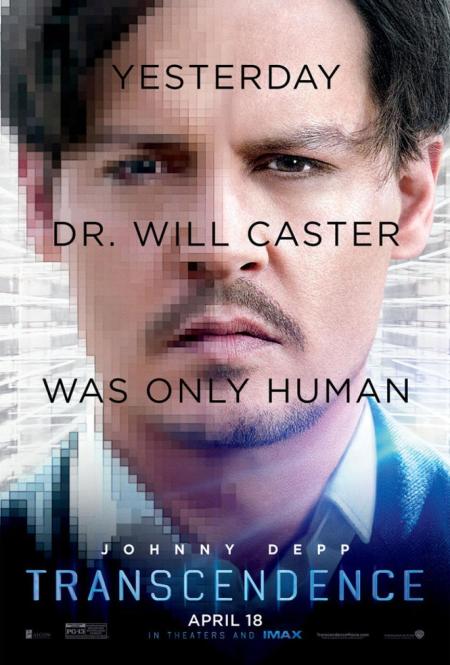
When the film begins, the U.S. and probably the world, is Internet fee. A catastrophe of some kind has wiped out the ability to use the Internet, wifi, and all the devices dependent upon such technology. The movie goes back five years so we can find out what happened and why. There, in the Berkeley area, we meet two married scientists, Will and Evelyn Caster (Johnny Depp and Rebecca Hall). They are both proponents of pushing the AI envelope…seeing how far science can take us in replicating thoughts, ideas, tissues and cells. Think a combination of “Her” and “The Six Million Dollar Man,” but on a much grander scale.
The film raises some interesting issues—certainly there are benefits to all this technology, but what happens when man’s bad impulses begin to outweigh man’s goodness. That’s the concern of a group led by Bree (Kate Mara). Early on in the film, a member of her group does something drastic which sets the wheels in motion for the rest of “Transcendence”–a showdown of man vs. machine.
With all the talent assembled for “Transcendence,” one would think this movie would be better. It just goes to prove that if it’s not on the page, no amount of good acting can breathe life into a film. Johnny Depp gets top billing, but in reality this movie belongs to Rebecca Hall. She’s a good actress and does what she can, but doesn’t have enough with which to work. Depp is absent from too many scenes and, for the most part, when he appears it’s via screen within a screen. Paul Bettany (who’s in the film more than Depp) and Morgan Freeman lend a sense of gravitas to the plot, portraying colleagues and friends of the Casters and act as the voices of reason. Finally, Cillian Murphy is on board as an FBI agent brought in to investigate an incident relating to Will (one can’t help but notice that Irishman Murphy sounds more American than Depp and that seems rather strange).
Maybe we’ve been exposed to too many television programs and movies about AI, but “Transcendence” just doesn’t seem to have any mojo. It falls to earth with a thud.
2 nuggets out of 4
Tags:Cillian Murphy, DC movie reviews, Johnny Depp, Morgan Freeman, Movie Reviews, Paul Bettany, Rebecca Hall, Science Fiction Movies, Transcendence
Posted in Arts, Movie Reviews | Leave a Comment »
April 14, 2014
Talk about puzzling and disappointing—“Under the Skin” is this and not much else. What was Scarlett Johansson thinking when she agreed to star in this film? Better still, why did I sit through the entire movie? “Under the Skin” is billed as science fiction, but excuse me if I like my science fiction with a tad more dialogue and exposition.
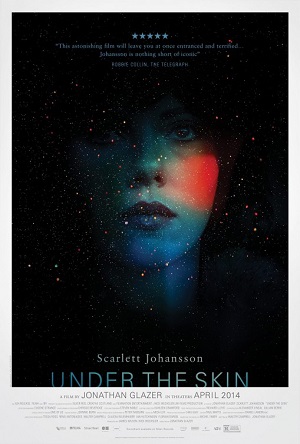 Directed by Jonathan Glazer and written by Glazer and Walter Campbell based on Michel Faber’s novel, “Under the Skin” is about a female alien who drives around Scotland luring single men into coming with her under a variety of pretexts and then using their bodies… for? Most of the time she drives a white van, but how she learned to drive or get money for gas (possibly money from her victims) is something we have to take on good faith. And don’t get me started on what she does about her clothing. Perhaps aliens don’t give off body odor, but certainly wearing the same clothing for days on end, running through all kinds of muck, surely that would give her clothes an “aroma.” But to give credit where credit is due, the lone amusing scene does answer the question about how/if aliens digest food.
Directed by Jonathan Glazer and written by Glazer and Walter Campbell based on Michel Faber’s novel, “Under the Skin” is about a female alien who drives around Scotland luring single men into coming with her under a variety of pretexts and then using their bodies… for? Most of the time she drives a white van, but how she learned to drive or get money for gas (possibly money from her victims) is something we have to take on good faith. And don’t get me started on what she does about her clothing. Perhaps aliens don’t give off body odor, but certainly wearing the same clothing for days on end, running through all kinds of muck, surely that would give her clothes an “aroma.” But to give credit where credit is due, the lone amusing scene does answer the question about how/if aliens digest food.
What is good about “Under the Skin?” The photography is breath-taking. When it’s not raining we are provided with some beautiful pictures of Scotland’s countryside. All the scenes are beautifully shot and the score is perfect for this moody sci-fi.
“Her” provided film-goers with just Johansson’s voice. If we didn’t know it before, we learned from “Her” that Johansson has a beautiful, lilting voice. In “Under the Skin” we have the exact opposite…just her body and very little else. To cast her in a movie and have her practically mute is a shame. The little dialogue Johansson speaks is used to draw men in. These men do speak, but their brogues are so thick they are nearly impossible to understand.
As noted earlier, “Under the Skin” has very little exposition, so if you decide to see this film, some of you may be as lost as I was. Who was the man on the motorcycle? What was he all about? An entry in Wikipedia will explain this to you. But if you need “Cliff’s Notes” to understand a film, is it really worth it? My recommendation is to save yourself the trouble and erase “Under the Skin” from your must-see list.
½ nugget out of 4
.
Tags:DC movie reviews, John Glazer, Michel Faber, Movie Reviews, Scarlett Johansson, Science Fiction Movies, Under the Skin
Posted in Arts, Movie Reviews | Leave a Comment »
August 19, 2013
Wouldn’t it be unique and fun to see a film where life in the future is terrific? Where we (Earth) haven’t been decimated by disease or war? Where the soundtrack of our lives isn’t an over the top doom and gloom score? Do you think your great-great grandparents were as pessimistic about the future as most filmmakers today? Just something to ponder as one sits through yet another “Isn’t life Hell on Earth?” film, which brings me to “Elysium.”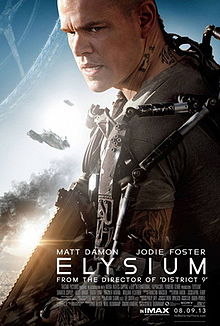
Written and directed by Neill Blomkamp, “Elysium” is set in 2154. Earth is unhealthy and overpopulated. Those who can afford to do so have emigrated to Elysium, a man-made space station where food is plentiful, sickness is a thing of the past and, well, life is good.
Max (Matt Damon) lives in a grimy version of Los Angeles, although he has always aspired to go to Elysium, and in flashbacks, we see a young Max making the promise to one day take his childhood girlfriend, Frey, to Elysium. Earth is a police state and free-thinking is not tolerated. Penalties for misbehavior can be severe and the population answers to faceless, robot-sounding superiors. Injured in a run-in with the “police,” Max runs into adult Frey (Alice Braga) in the hospital where she’s now a nurse. They reconnect and Max learns that Frey is a single mother with a child who has leukemia. She fervently hopes to somehow get to Elysium so her daughter can be cured. Protecting entrance to Elysium’s borders is Secretary of Defense Delacourt (Jodie Foster), a government official who enforces anti-immigration laws at all costs, keeping Elysium safe for the rich. A variety of circumstances come together which compel Max to get to Elysium one way or another.
What makes “Elysium” different from other doom and gloom films is its humanity. To some extent, this is due to the actors. Singled out for special praise is William Fichtner as a company owner who holds the fate of many in his hands. He is one of the best character actors in the business and really excels at playing conflicted villains. Alice Braga is also very good as the mother determined to do right by her daughter. But the true heart and soul of the movie is Matt Damon. He’s outstanding at playing the everyman asked to do a little more. With “Elysium” he is as good as the script allows him to be. Surprisingly the one jarring note is Jodie Foster. This two-time Academy Award winner‘s performance is almost robotic in nature and just not very good. Making matters worse is her very peculiar accent.
It’s almost impossible to watch Elysium and not think about America’s immigration policy. Maybe that’s what helps make “Elysium” relatable. Elysium won’t bore you, but it’s not something you’ll think very much about, if at all, once you leave the theatre.
2 nuggets out of 4
Tags:DC movie reviews, Elysium, Jodie Foster, Matt Damon, Movie Reviews, movies, Neill Blomkamp, Science Fiction Movies, William Fichtner
Posted in Arts, Movie Reviews | Leave a Comment »
July 24, 2013
Sometimes, not often, but sometimes actors with genuine chemistry, who also seem to be having fun, translates into an enjoyable afternoon at the movies. Such is “R.I.P.D.“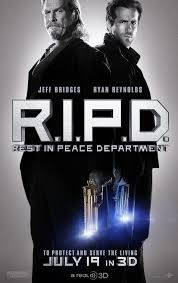
Ryan Reynolds plays Nick, a Boston police officer who is killed in the line of duty. Upon his death, he jarringly lands in the Rest in Peace Department (R.I.P.D.), at the desk of Proctor (Mary-Louise Parker). She explains that she is his boss and that R.I.P.D. is a sort of waiting station for law enforcement folk whose ultimate fate has yet to be decided—thumb’s “up” or “down” in the truest sense (for those of you who watched the final episode of “Lost,” this scenario might make more sense to you). The department is charged with finding and killing criminals who are dead—deados—but because they haven’t accepted their fate, still function on Earth. Complicated? It was to me and I admit that it took me a while to completely understand this concept.
Proctor partners Nick with Roy (Jeff Bridges), a lawman from the 1800s, and their assignment is to return to Earth and finish off the Boston deados. Complicating the job is that Nick primarily wants to find out who killed him and is still grieving over the fact that he never said good-bye to his wife. Oh, one more thing. When Nick and Roy come back to Earth, they won’t look like their former selves. That accounts for much of the movie’s fun. You might think this gag would grow old, but it never does. Some of that credit must go to veteran character actor, James Hong.
Kevin Bacon is very good as Nick’s former partner. So glum and serious in “The Following,” he’s anything but in R.I.P.D, and it’s highly entertaining.
Parker, Reynolds and Bridges are all terrific and really seem to be having fun with their roles and with each other. Bridges in particular looks like he just walked over from the “True Grit” set—he is every inch the former lawman and if he was any more grizzled, one wouldn’t be able to understand him.
“R.I.P.D.” does have special effects and fun weapons and they all work without overwhelming the film (but 3D is not necessary—save your money). Nick’s “death” scene is spectacular as are some of the transformations that occur.
So what stops “R.I.P.D.” from being a better movie? Something is missing and it’s hard to put one’s finger on it. Robert Schwentke’s direction seems to lack snap or point of view. Maybe the screenplay written by Phil Hay and Matt Manfredi, with story by David Dobkin and Manfredi, based on Peter M. Lenkov’s “Dark Horse” comic, is lacking.
So, while “R.I.P.D.” has its short-comings, it is fun…not memorable, but fun nevertheless. On a hot, summer day, that can be just the ticket.
2 nuggets out of 4
Tags:Dark Horse, Fantasy Movies, Jeff Bridges, Kevin Bacon, Lost, Mary-Louise Parker, Movie Reviews, movies, R.I.P.D., Ryan Reynolds, Science Fiction Movies, The Following, True Grit
Posted in Arts, Movie Reviews | Leave a Comment »
June 13, 2013
Non-trekkies, jump in…the water is fine.
I review this movie as an “average Joan,” with not too much “Star Trek” knowledge. In fact, I’m almost as non-Trekkie as they come. I’ve seen a few episodes of the original series and saw the movies, including the first re-boot, but that’s it. However, I’m living proof that you don’t need to know a lot in order to appreciate the high energy entertainment that is “Star Trek into Darkness.”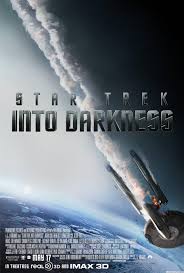
The opening scenes with the crew are a tad confusing—volcanoes, other planets and beings—frankly, I didn’t know what was happening. But, luckily, none of that matters. Director J.J. Abrams and writers Roberto Orci, Alex Kurtzman and Damon Lindelof are very smartly are showing us the dynamics of the Enterprise crew. If you are just nominally familiar with “Star Trek” (or even lesser so), it’s an opportunity to learn more about each character. For those with an encyclopedic mind for all things “Star Trek,” it’s fun to learn more about each character’s back story.
To talk much about the plot would spoil the story. “Star Trek” fanatics will puzzle over some choices and might ask themselves if cryogenics causes one’s accent to change. Up until that point, the story makes a lot of sense and raises some interesting questions…as did the original series. What makes one become malevolent? Is there a point where a person can still resist the pull to the dark side? Is someone completely evil? How far will you go to help a friend…a colleague?
“Star Trek’s” cast is more than solid. Chris Pine as Kirk and Zachary Quinto as Spock have terrific chemistry with one another and they are still believable as the young adult duo. Simon Pegg provides just the right touch of levity to Scotty as does Anton Yelchin as Chekov. Veteran actors Bruce Greenwood (Pike) and Peter Weller (Marcus) lend an extra source of gravitas to the film. Zoe Saldana gives Uhura a shot of sass as Spock’s girlfriend. Finally, behold Benedict Cumberbatch as the film’s chief villain. He lives up to every bit of hype he has received.
It’s fun to imagine what some of our most favorite characters might have been like in their earlier years. That’s what makes prequels so entertaining. However, prequels come with self-imposed obstacles. We, the audience, know how certain plot points should/will end. That’s not to say the storytelling can’t be done well. It’s just that from an overall perspective, the story on the screen can’t be perfect. Such is the case with “Star Trek into Darkness.” It’s enjoyable, but not perfect.
3 nuggets out of 4
Tags:Alex Kurtzman, Benedict Cumberbatch, Chris Pine, Damon Lindelof, DC entertainment, entertainment, J.J. Abrams, Movie Reviews, movies, Roberto Orci, Science Fiction Movies, Star Trek into Darkness, Zachary Quinto
Posted in Arts, Movie Reviews | 2 Comments »









